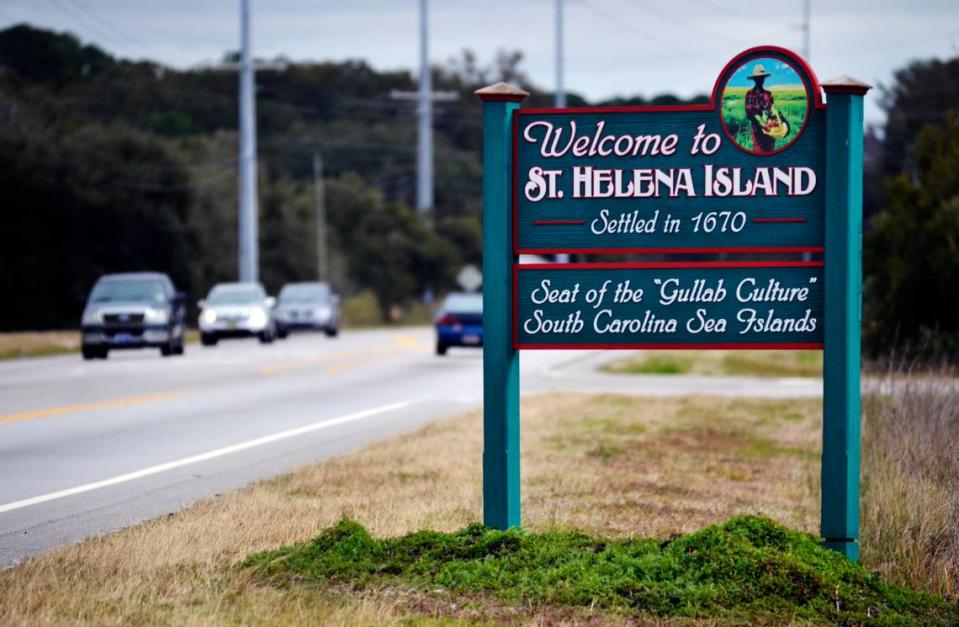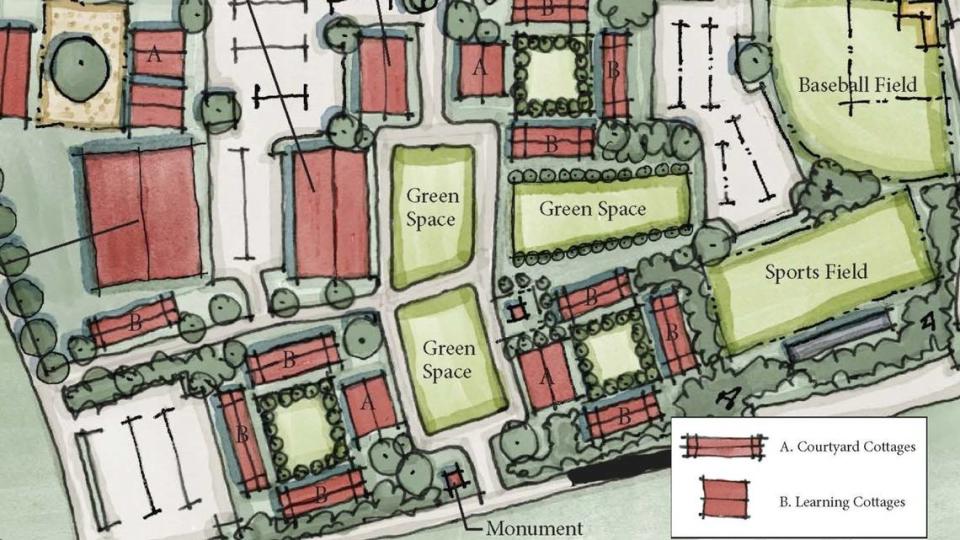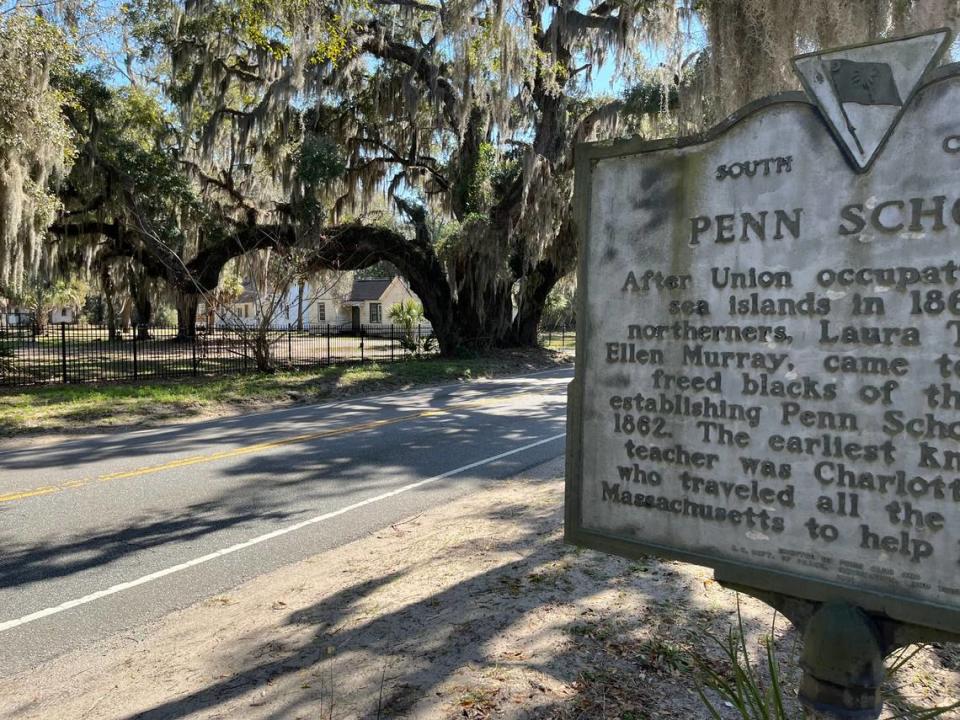Meet the spirited teacher behind St. Helena’s 1st charter school. ‘It was a rallying cry’
After four years of planning, 400 interviews and securing more than $4 million in public and private funding, a Sea Islands-based charter school founded by a passionate teacher who earned her stripes teaching in some of New York City’s best charter schools is now accepting students in anticipation of its first day of school in August.
Sea Islands Heritage Academy promises to bring a “new model” of education to the Lowcountry that will be “place-based,” emphasizing Gullah/Geechee culture, its backers say.
The charter school will make its debut in temporary facilities on Lady’s Island. But the permanent campus will fittingly be constructed on St. Helena Island, which is home to one of the largest contiguous Gullah/Geechee communities still practicing the traditions of their West African ancestors. It will be the island’s first charter school.
“Sea Island Heritage Academy, in so many ways, is the rallying cry of the community,” says Alana Jenkins Marchel, the school’s executive director. “There’s a need and we’re trying to meet that need.”
Jenkins Marchel founded the school calling on her teaching expertise earned while working 15 years in high-performing New York charter schools, which are known for innovation that may include themed programs.
The theme at Sea Islands Heritage Academy, the school advertises, will be providing “equitable access to education that uplifts and celebrates Gullah Geechee heritage.” The free public school will be open to anybody with South Carolina residency.
One example of the community-centered education will come in earth science class, where one of the environmental lessons will feature challenges faced by local fishermen, including one who will talk about the causes behind the demise of his oyster beds two years ago.
“Place-based instruction allows the community to be brought into the classroom,” Jenkins Marchel says.
‘Relentless leader’
Others have tried to start a charter school on St. Helena but those efforts never got off the ground. Christina Washington, a member of the school’s board of directors, called the creation of the school a “huge undertaking” and credits Jenkins Marchel’s Chutzpah for getting the school the point of enrollment.
“Alana is a relentless, intensely committed leader and educator — and she has a keen ability to connect with people from all different walks of life all over this community,” Washington said.
For her part, Jenkins Marchel is quick to credit residents, not-for-profits and other partners who are backing Sea Islands Heritage Academy with their ideas and funds. “We didn’t do this all alone,” she says.
But Jenkins Marchel doesn’t shy away from a challenge. The work of social justice, she says, is “in my blood.” One of the first photos ever taken of her shows a 2-month-old in the arms of her father at an NAACP meeting to discuss school desegregation in Yonkers.
Jenkins Marchel sees education as a necessary foundation to address inequalities of all kinds. She also believes in the power of charter schools. After graduating with an English degree from Middlebury College in Vermont, she worked as a 6th grade reading and writing teacher and later as a dean of students and vice principal at schools across New York.
At one of the schools, 30% of the students had some form of disability, but 100% performed well enough in the end to be accepted into college.
“It happened because that school was truly rooted in community first,” Jenkins Marchel said.

Funding a charter school
The education at Sea Islands, Jenkins Marchel says, will be rooted in community, too, with personalized, relevant lessons “wrapped up in where you are from.” Familiar groups such as the Gullah Kinfolk Theater, the Gullah Geechee Cultural Heritage Corridor and Gullah Farmers Co-op will be called on to assist in delivering those lessons.
Curriculum will follow state education standards and the school will offer a college preparatory program that includes advanced placement courses. But because Sea Islands Heritage Academy will have no ties to Beaufort County School District, it will have the flexibility to do things differently when it comes to its finances, personnel and instruction.
South Carolina charter schools must be “authorized” by a local school district, an institute of higher education or the South Carolina Public Charter School District. Sea Islands Heritage Academy is authorized by the state Charter School District through 2034.
As a result, it will not receive any funds from the Beaufort County district, academy officials and the Beaufort County School District confirmed. The academy has secured $3 million in state and federal funding through the Charter School District. School officials say it is also on track to receive an additional $1.5 million from four charities in its initial years of operation including $800,000 from the Coastal Community Foundation, a public charity serving nine Lowcountry counties. The CCF is the largest grant-making entity in South Carolina serving donors and not-for-profits.
The CCF award to the school was the largest gift ever from its catalyst grant program, which supports ideas with the potential to have large impacts. Sea Islands Heritage Academy is the only school in Beaufort County whose education model was co-designed by community members, CCF President Darrin Goss Sr. said when CCF awarded the grant. “We believe its educational model emphasizing the close ties to culture and heritage will be transformational for students,” Goss said of Sea Islands Heritage Academy.
The Walton Family Foundation, the philanthropic arm of Walmart founders Sam and Helen Walton, has contributed another $100,000.
Celebrating Gullah/Geechee heritage
“People have been waiting for this school,” says Washington, “It’s a new model.”
Washington is a Washington D.C. native who moved to St. Helena Island with her husband Travis and their three children in 2018. Washington’s children went to a top school in Washington D.C. It had all the bells and whistles including the best infrastructure, equipment, software and musical instruments. But Washington felt as if her children, as Black students, “were not being seen” among the mostly white student body and teaching staff. Mr. Washington has family ties in the Lowcountry and the family moved to St. Helena, with the goal of finding a school that reflected the community where they reside.
Christina Washington jumped at the chance to work on the design team for the new St. Helena charter school after meeting Jenkins Marchel.
“We appreciate the way of life, the celebration of Gullah/Geechee heritage and we wanted to preserve that for our own kids,” Washington said.
Idea born of tragedy and hope
The foundation of Jenkins Marchel’s idea for a charter school serving the mostly rural communities of color in coastal South Carolina was her teaching experience and passion for education and equality, but outside forces were at work, too.
In 2020, during the COVID-19 pandemic, Jenkins Marchel was living in Brooklyn, N.Y., with her home a half mile from a funeral home and two miles from a hospital. With body counts rising, it was a challenging place to live, and when her school sent students home, Jenkins Marchel packed up the car and drove 800 miles to St. Helena Island, where she would settle permanently in a second home she had previously purchased in 2018.
Not long after arriving in the Lowcountry, however, she received devastating news. A former student at a charter school where she had worked had been killed. A big factor in that student excelling in the classroom, Marchel remembered, had been the strong connection between the school and his family. As she sat on the porch of her new St. Helena home, Jenkins Marchel’s mind churned with thoughts of her former student and the unique place where she was now living. She decided to found a charter school and went to work.
Oftentimes, when outside interests pursue these types of endeavors in minority communities, says Washington, the board of directors member, they say, “Let’s totally change everything and make it great and wonderful.” But community strengths, which are a local source of pride, can be overlooked, she adds.
A design team met with 400 residents over 10 months to avoid that mistake in planning for the St. Helena school, Washington said.
What residents wanted most, Jenkins Marchel learned, was a return to a community learning style in which students interact with local residents and businesses — and a school that communicates closely with parents. They also wanted to see the schooling impart the value islanders have for the seaside landscape and their traditions so children can see themselves living there “for their entire lives,” if they choose, Jenkins Marchel said.
Facilities focus on community, too
The physical set up of Sea Islands Heritage Academy will be different. Different ages of students, for example, will sharing classrooms to facilitate learning.
The academy also is working with a national charter school facilities development organization called Building Hope to design a campus that looks and feels like a family compound with multiple buildings.

The school is in the process of closing on the purchase of land along Sea Island Parkway on St. Helena where the permanent campus facilities will be constructed and ready for use in January 2026.
In the meantime, while the permanent campus is under development, a temporary site with modular units that can serve up to 126 students has been approved at Grace Chapel AME Church on Lady’s Island.
During the first year, the school is accepting 6th and 7th graders but a grade level will be added each year thereafter with the eventual goal of serving 500 students in grades 6-12 at the new St. Helena Island facility.
‘My forever home’
Jenkins Marchel decided to move from New York to the Lowcountry in the first place after the 2018 death of her grandfather, who was born in South Carolina’s Whitehall area, a place she had visited while growing up in New York. She drew a 60-mile radius around Savannah and soon found herself driving along Martin Luther King Jr. Drive on St. Helena Island, past the live oaks nearly as old as the country. She stopped at a church where a woman was selling plates of fish and rice and beans. She passed the historic Penn Center, one of the country’s first schools for freed slaves — and where King would retreat in the 1960s to re-energize during the Civil Rights period. Jenkins Marchel was awestruck. “I said, ‘This is my forever home.’”

On May 26, she closed on a house purchase. The closing, by chance, happened to fall on the weekend of the Original Gullah Festival in Beaufort. Jenkins Marchel heard Aunt Pearlie Sue of the Gullah Kinfolk Traveling Theater — the creation of Anita Singleton-Prather, a Sea Islands native know as the “keeper of the culture” — entertaining audiences with Gullah-flavored stories. The timing of the purchase with the festival affirmed her decision.
A few years later, Jenkins Marchel was sitting on the porch of her St. Helena Island home hatching an idea for a new charter school that, in its own right, would celebrate Gullah/Geechee heritage.


